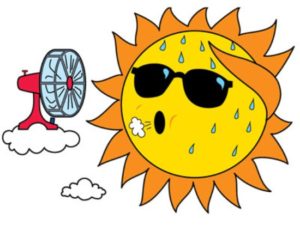Heat and Humidity , how it affects our bodies @CCG Pediatrics
Heat and it’s affects on medically fragile children and elderly folks
It is the best time of the year with the sun and the high temperatures, it is what we look forward to on the long days of winter. BUT the heat and humidity can take it’s toll on our bodies.
How humidity affects our bodies:
Humidity directly affects the amount of allergens in the indoor environment. In particular, high humidity causes both dust mite populations and mold colonies to grow, thereby greatly increasing allergy sufferers’ total allergen load. Though we do not often think of it, we are inherently fragile creatures. Something as seemingly small as a five degree drop in body temperature can have severe health consequences, including hypothermia. Five degrees higher and the human body begins to experience hyperthermia. “Dehydration depletes the body of water needed for sweating and thickens the blood, requiring more pressure to pump it through the body, thus straining the heart and blood vessels.” As blood goes to the external surface of the body, less goes to the muscles, the brain, and other organs. Physical strength declines, and fatigue occurs more quickly than under normal conditions. Mental faculties, such as alertness, may also be adversely affected.” ( quoted from Achoo allergy)Medically fragile children and the elderly’s bodies are compromised and the heat and humidity can have devastating affects.
If you have to be out in the sun and heat:
- wear light colored/light weight clothing
- keep hydrated
- limit outdoor activity to the morning and evening hours
If you can stay in doors, or go to libraries, the mall, movie theaters, places who have air condition.
Monitor your medically fragile child for:
- Increase heart rate, increased respiratory rate, or increased work breathing
- increased temperature
Signs of dehydration: drowsiness, dry mouth, few or no tears, less urine, irritability, dry cool skin.
If you notice these signs call your Primary care physician. Take your child’s clothes off. Put a cool wet cloth on their head, place the child in air condition. Give extra water if this is ok with your physician.
Heat stroke in the elderly:
increased heart rate, red hot skin, throbbing headache, dizziness, heat exhaustion, extreme high temperature over 103F
If you notice these signs call their Primary care physician. Place the adult in air condition or with a fan, try to give them fluids if possible, small amounts, like Gatorade (it has sodium and potassium in it), or give them a Popsicle. Cool off their head with a wet, cool cloth and also try to take some of their clothes off.
ENJOY THE SUMMER SUN but be careful!
Image from Bing

